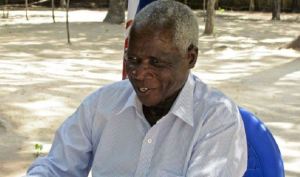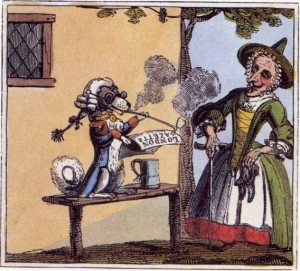nsnbc : Alfonso Dhlakama, leader of Mozambique’s Renamo party and insurgency is continuing his demand that senior positions in the armed forces and the police be given to members of Renamo’s illegal militia.
 Afonso Dhlakama, leader of the Mozambican rebel movement Renamo, is continuing to demand that senior positions in the armed forces and the police be given to members of his illegal militia.
Afonso Dhlakama, leader of the Mozambican rebel movement Renamo, is continuing to demand that senior positions in the armed forces and the police be given to members of his illegal militia.
In an interview with the independent television station STV and its sister publication, the daily paper “O Pais”, Dhlakama said “this is a practical matter of numbers – how many commandos, generals, second lieutenants, lieutenants, brigadiers and colonels will have to be included, balanced with those who came from the government’s side”.
“We don’t want two armies”, he said. “Dhlakama never wanted to keep a second army, as if he were in another independent country. Gorongosa (the central district where Dhlakama’s military base is located) is not independent – it’s part of the Mozambican state”.
Singing what most observers of Mozambique would describe as “his same old song, Dhlakama makes promises about peace and demobilization of the Renamo insurgency while making unobtainable, illegal and unconstitutional demands.
Dghlakama claimed that including the Renamo militia men in the armed forces (FADM) would turn them from a political party army into a “republican force”, whereas in reality it does precisely the opposite.
Dhlakama omitted to mention that any Renamo fighter who wanted to join the army could have done so in 1994, when the FADM was formed. The peace agreement signed in Rome on 4 October 1992 by Dhlakama and the then President, Joaquim Chissano, envisaged an FADM consisting of 30,000 men, half from the existing government army, the FAM/FPLM, and half from Renamo. But they all had to be volunteers, and few fighters on either side wished to remain in the military.
When 30,000 volunteers could not be found, attempts were made to pressgang people into the FADM – this merely led to violence, as both armies disintegrated in a wave of mutinies that spread across the assembly areas where both government and Renamo troops were waiting for demobilisation. As a result both sides had to accept that the FADM would be formed out of whoever volunteered. The FADM thus came into existence in mid-1994 consisting of less than 12,000 troops – about two thirds from the FAM/FPLM and one third from Renamo.
All other fighters should have been demobilized, receiving 18 months demobilisation pay. In violation of the agreement, Dhlakama kept back a few hundred men (the exact figure has never been revealed) on the grounds that these were his bodyguards. This was the origin of the current Renamo militia. Dhlakama claims his militia is covered by a clause in the peace agreement allowing Renamo to guarantee the security of its leaders with its own force that would be equivalent to the police. That clause was specifically a transitional arrangement between the ceasefire and the first general elections (in October 1994). The Renamo force has thus been illegal since late 1994.
Since the law on military service of 1997, the FADM has recruited on the basis of conscription. All Mozambicans, of both sexes, are legally obliged to register for military service in the year of their 18th birthday. When they register, they are not asked which political party they support. Some of the Renamo fighters who joined the FADM in 1994, are still there, some of them in senior posts, including the FADM deputy chief of staff.
Asked when he intends to leave the Gorongosa bush, Dhlakama said that would depend on his security. “I would like to leave today, if everything was in place and guaranteed. I would like to be with my family, and with the children, on the beach in Maputo. But I can’t. I would like the government at least to guarantee that nobody will again send the Mozambican army to shoot against Dhlakama”.
So one of the conditions for his departure from Gorongosa was “the inclusion of our commandos in senior positions in the FADM, so that in future people from Frelimo in the FADM cannot plan secret operations without those from Renamo being aware of them”. He claimed that this could all be solved after the Frelimo Congress, scheduled for late September. “I think a lot of things will go much faster after the Congress”, Dhlakama said.
Dhlakama and Renamo began recalling veteran fighters and began recruiting new insurgents in 2012, after the discovery of major natural gas reserves in the country and after it became clear that Mozambique was poised to become the world’s second-largest exporter of liquefied natural gas (LNG) – next after Qatar – by the mid 2020s.
CH/L – nsnbc 07.09.2017
nsnbc international is independent but depends on modest donations from readers like you. Please use the PayPal button to the right to support us with a one time donation or with a few coins per month. Thank you for your much-needed support. We could not continue without help from readers like you.
Source Article from https://nsnbc.me/2017/09/07/dhlakama-insists-on-senior-positions-for-renamo-in-mozambiques-armed-forces-and-police/
 RSS Feed
RSS Feed















 September 7th, 2017
September 7th, 2017  Awake Goy
Awake Goy 











 Posted in
Posted in  Tags:
Tags: 













